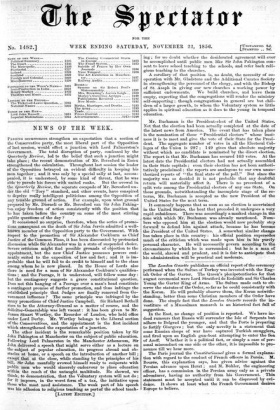NEWS OF THE WEEK.
PAssING occurrences strengthen an expectation that a section of the Conservative party, the most liberal part of the Opposition of last session, would effect a junction with Lord Palmerston's Government. The total disruption of party, confessed by the Quarterly _Review, led to the belief that such a junction might take place ; the recent demonstration of Mr. Beresford in Essex strengthened the calculation. Throughout last session the leader of the Opposition betrayed an evident difficulty in keeping his men together ; and it was only by a special sally at last, accom- panied, it is understood, by some kind of threat, that he was able to parade his forces with united ranks. But the avowal in the Quarterly Review, the separate escapade of Mr. Beresford un- der the old " Tory " standard, and other events, have conspired to deprive really intelligent politicians among the Opposition of any tenable ground of action. For example, upon what ground prepared by Mr. Disraeli or Mr. Beresford can Sir John Peking- ton enjoy freedom of action consistently with the position that he has taken before the countoy on some of the most stirring public questions of the day ?
It occasioned no surprise, therefore, when the series of promo- tions consequent on the death of Sir John Jervis admitted a well- known member of the Opposition party to the Government. With respect to the promotion of Sir Aleiander Cockburn as Chief Justice of the Common Pleas, it has been discounted by protracted discussion while Sir Alexander was in a state of suspended choice. Severe criticism might find possible grounds of objection to the appointment, but the new Chief Justice possesses powers emi- nently suited to the exposition of law and fact ; and it is im- probable that he will fail to do credit to himself and to the class among whom he is now placed. In the House of Lords also there is need for a man of Sir Alexander Cockburn's qualifica- tions ; and the Peerage, it is understood, will follow some day : but the contingency suggests a grave 'constitutional question. Does not this hanging of a Peerage over a man's head Constitute a contingent promise of further promotion, and thus infringe the established principle that Judges are finally removed from Go- vernment influence ? The same principle was infringed by the many promotions of Chief Justice Campbell. Sir Richard Bethell rises to be the Attorney-General as a matter of course, and the Solicitor-Generalship was left vacant : it has been given to Mr. James Stuart Wortley, the Recorder of London, who held office under Lord Derby. Mr. Wortley belongs to the Liberal section of the Conservatives, and the appointment is the first incident which strengthened the expectation of a junction.
The other incident is the remarkable position taken by Sir John Pakington at Manchester on the subject of public education. Following Lord Palmerston in the Manchester Athenaeum, Sir John delivered a speech that might serve either as a lecture on the subject of popular education, its progress abroad and ob- stacles at home, or a speech on the introduction of another bill ; except that at the close, while standing by the principles of his bill, Sir John manfully avowed himself ready to cooperate with public men who would sincerely endeavour to place education within the reach of the untaught multitude. He showed, we think, to demonstration, that the Voluntary system will not do ; for it imposes, in the worst form of a tax, the initiative upon those who most need assistance. The weak part of his speech was his adhesion to religious teaching as part of the school teach- ing ; for we doubt whether the desiderated agreement will ever be accomplished until public men like Sir John Pakington con- sent to leave school teaching to the schools, and refer back reli- gious teaching to the churches.
A corollary of that position is, no doubt, the necessity of co- operation with Mr. Gladstone anti:the Additional Curates Society in strengthening the personnel of the clergy, and with the Bishop of St. Asaph in giving our new churches a working power by sufficient endowments. We build churches, and leave them empty, expecting that the congregations will render the ministry self-supporting ; though congregations in general are but chil- dren of a larger growth, to whom the Voluntary system as little applies in spiritual education as it does to the young in temporal education.


























